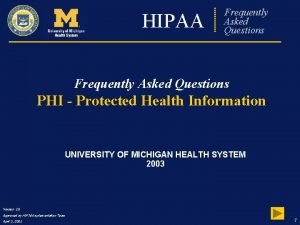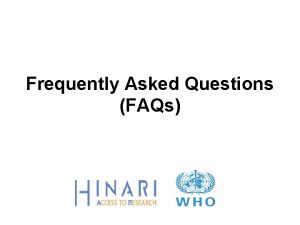FAQs Frequently asked questions Will this cost money


- Slides: 2

FAQs (Frequently asked questions) Will this cost money? Free resources are available for members including access to the website for funding advice, tools for mission, training and other useful resources. A Window For Every Church – your own church ‘portal’ is currently freely available (subscriptions are charged for greater access). Free initial consultancy offered from our Senior Development Manager – John Wareham. Ongoing support may be chargeable – based on the level of support required. So you want to: Payroll & HR services available – these are chargeable but at reduced rates. Why contact TCC? TCC are experts in the voluntary sector on matters of project management, governance, funding, strategic partnerships and employment. They are also well connected with other experts to draw in for churches when required. Churches today are required to have a level of ‘professionalism’ when engaging in work with communities. TCC helps churches meet the requirements to set up and run projects effectively at a local level. TCC do not come in and take over – they come to support, enable and upskill local teams to run their own projects. TCC can manage entire projects for churches if required – but TCC would only do this if requested by the management team of that church. To contact TCC: Website: www. churchandcommunity. org. uk E-mail: admin@churchandcommunity. org. uk Tel: 0788 333 9698 think about forming a company?

Why incorporation? Many organisations think about changing their legal structure when the trustees and management committees are concerned about personal liability. Incorporation means creating a legal identity for the organisation that is different to its members - a corporate body. In an unincorporated association (many charities and voluntary and communities start out) or trust, the law does not recognise a difference between the organisation and its members - it is simply seen as a group of people. The biggest advantage of incorporation is in the limited liability for members of the organisation and its governing body. However, this does not limit the liability of the Trustees of a charitable company where wrongdoing has occurred. A charitable company can own property and sign contracts in its own name. You should think about becoming a charitable company if your charity has employees, owns property, signs contracts to complete work, has long-term financial commitments such as a lease or runs risky activities. Unfortunately, an unincorporated association or trust can’t simply convert to a charitable company. Instead, your organisation must first form and register a new company (usually a company limited by guarantee) with Companies House using a new governing document called memorandum and articles of association. The new company must then be registered as a charity with the Charity Commission. The original charity will be closed down once everything has transferred to the new charitable company. Steps to follow: 1. Check the constitution of the existing charity to see if there is a restriction regarding incorporation (this is not common but should be checked). If there is a restriction then Charity Commission approval must be sought first. 2. Check the constitution of the existing charity to see if there is a dissolution clause. If there isn’t then the constitution must be amended to include one. 3. Talk to your legal and financial advisors for advice. 4. Prepare the Memorandum and Articles of Association (sometimes shortened to Mem and Arts) for the new company. 5. Register the company with Companies House (TCC can assist with this) 6. Register the company as a charity with the Charity Commission (TCC can assist with this) 7. Transfer all assets and liabilities from the old, unincorporated charity to the new charitable company. 8. Dissolve (close down) the old charity (if it is necessary). Remember that you must follow the provisions in the constitution until the time that the old charity is dissolved.



